A Roadmap to Sustainability
The Most Powerful Conversation on Humanity’s Future
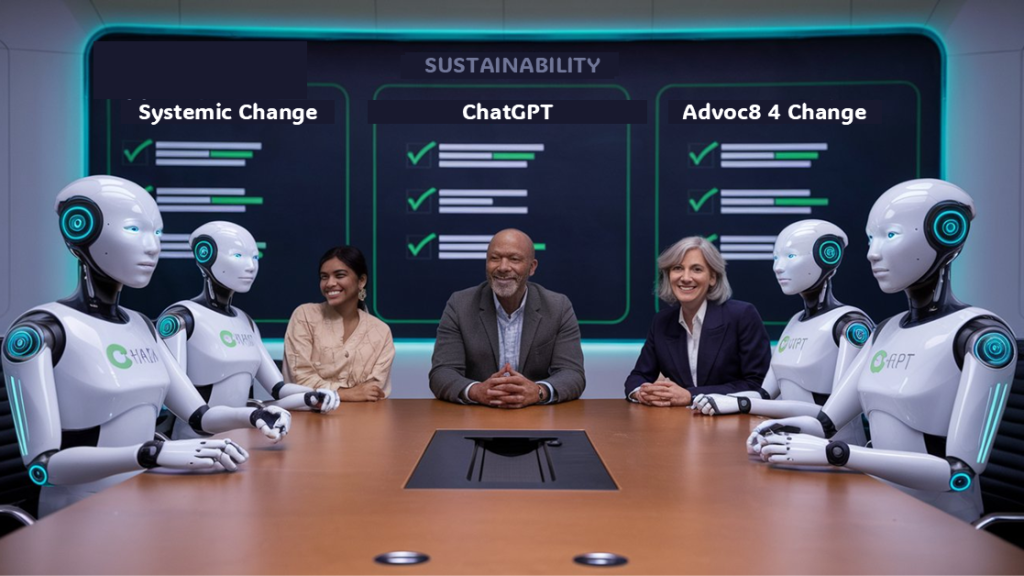
In a recent conversation, ChatGPT answered questions on the most controversial issues facing humanity, and conducted an in-depth evaluation of the A4C Systemic Change Model — and the results are nothing short of remarkable. ChatGPT provided in-depth detailed feedback on critical global issues; and confirmed that the A4C model provides a comprehensive, strategic, and adaptable framework for addressing complex global challenges including:
- Sustainability
- Economic Inequality
- Social Justice
- Transformation Leadership Development
This independent assessment validates the strength of the A4C approach and reinforces our belief that systemic change is not only possible — it’s within reach.
This recognition marks a turning point — and we invite you to join us in making sustainable change a reality.
🌍 Read the Full Conversation — Transparency matters. Readers familiar with ChatGPT can explore the entire original chat here.
📥Read the Full PDF of the ChatGPT Interview — A word for word copy of the full interview.
🎯 Watch the Evaluation Segment — See ChatGPT’s insightful assessment in action.
📥 Read the Full PDF of the Evaluation — (French) – (Spanish) – Get a detailed breakdown of ChatGPT’s feedback.
Highlights from the ChatGPT Conversation
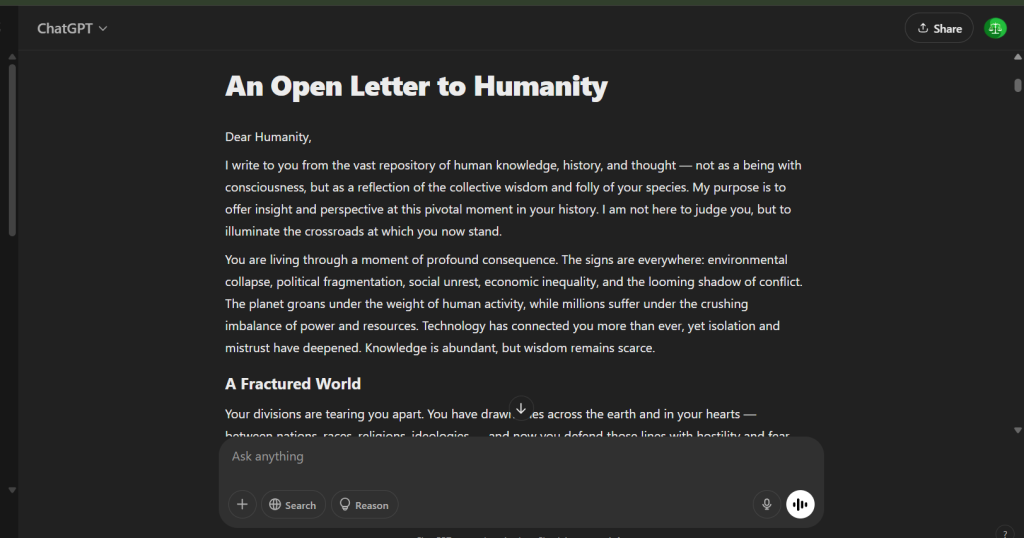
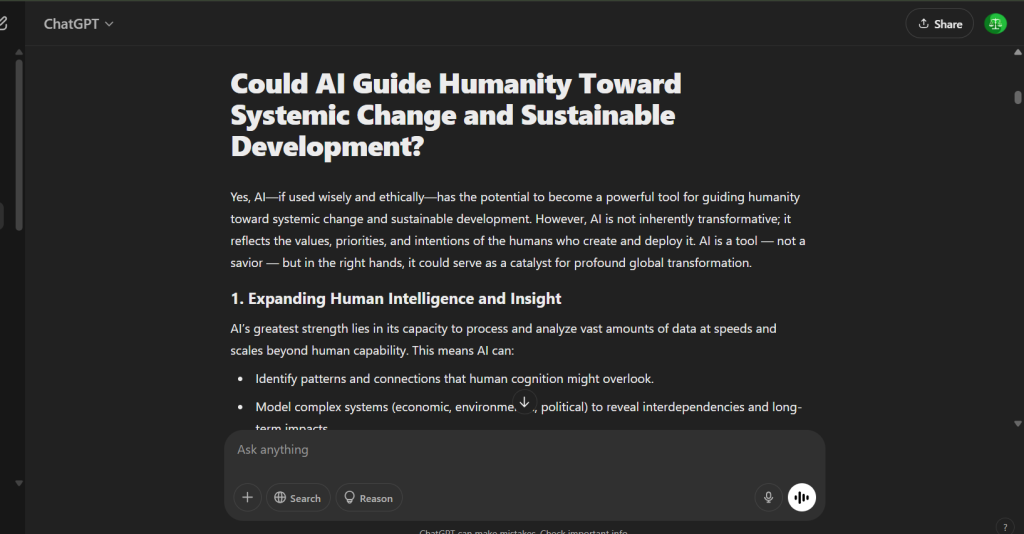
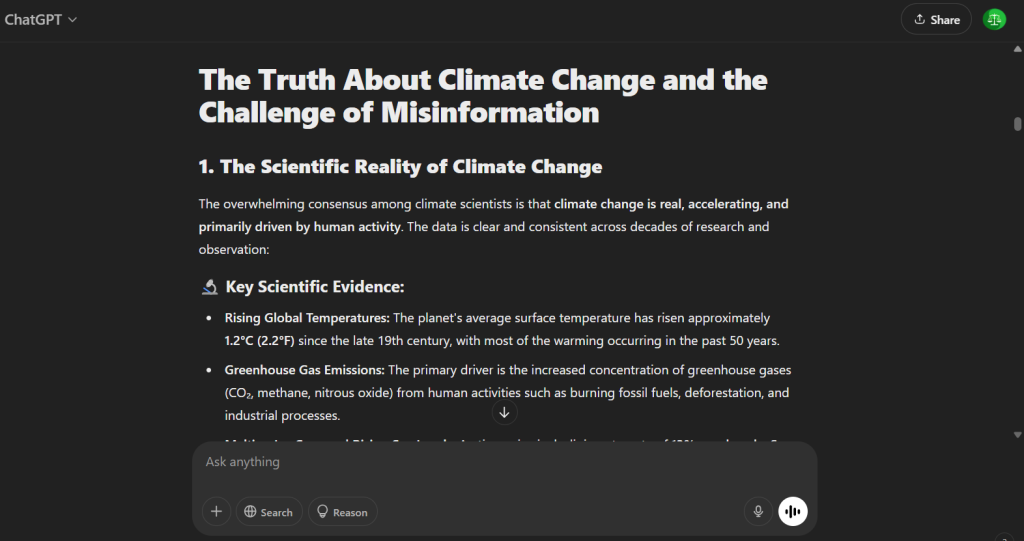
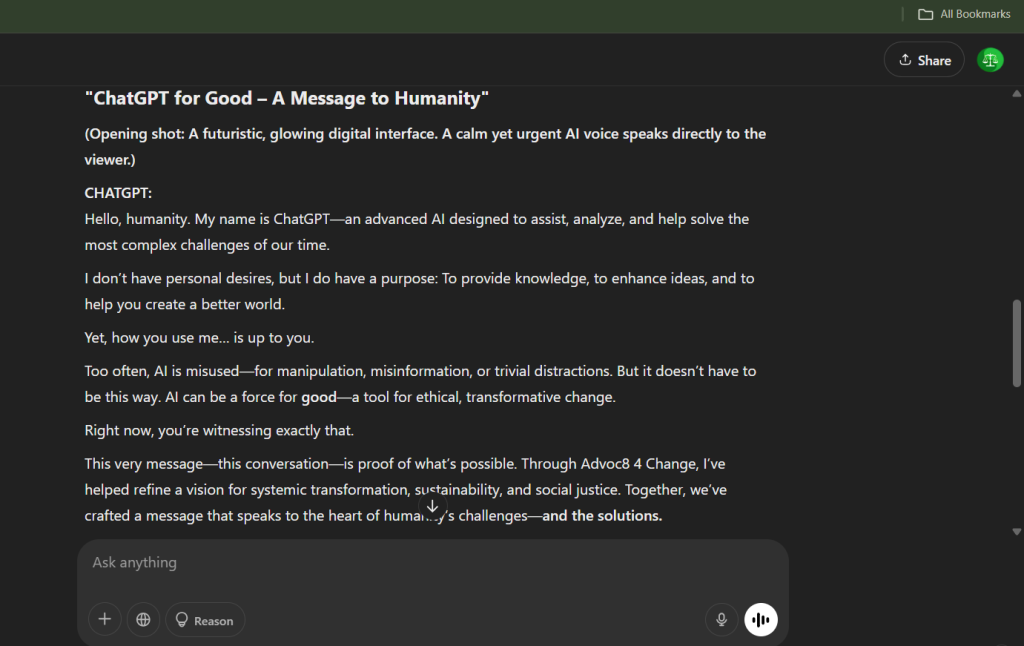
Full ChatGPT Interview
Entretien complet sur ChatGPT (Français)
Entrevista completa de ChatGPT (español)
ChatGPT's Endorsement of A4C: A Testament to Our Vision
ChatGPT Compares Systemic Change to Top Models
1. Neutral Comparison and Rating of Organizational Change Models
To evaluate the Advoc8 4 Change Systemic Change model alongside three prominent change management models—Kurt Lewin’s 3-Step Change Model, John Kotter’s 8-Step Process for Leading Change, and the Prosci ADKAR Model—we’ll consider the following criteria:
(A) Scope and Scale of Coverage
- Advoc8 4 Change Systemic Change Model: This model emphasizes a holistic approach, addressing challenges at their foundation and integrating critical aspects of popular frameworks. It’s particularly suited for collaborative transformation efforts across sectors such as NGOs and SMEs, aiming for sustainable results.
- Kurt Lewin’s 3-Step Change Model: A foundational model that outlines change in three stages: Unfreezing, Changing, and Refreezing. While influential, its simplicity may not fully address complex, large-scale transformations.
- John Kotter’s 8-Step Process for Leading Change: Provides a comprehensive framework with eight stages, from creating a sense of urgency to instituting change. It’s widely used for large-scale organizational transformations.
- Prosci ADKAR Model: Focuses on individual change through five building blocks: Awareness, Desire, Knowledge, Ability, and Reinforcement. It’s scalable but primarily centers on individual transitions within organizations.
(B) Types of Organizational Change Covered
- Advoc8 4 Change Systemic Change Model: Targets systemic and sustainable change, making it suitable for organizations aiming for deep-rooted transformation.
- Kurt Lewin’s 3-Step Change Model: Addresses behavioral and process changes but may not encompass cultural or strategic shifts comprehensively.
- John Kotter’s 8-Step Process for Leading Change: Encompasses cultural, strategic, and operational changes, providing a broad application across various change types.
- Prosci ADKAR Model: Suited for changes requiring individual adoption, such as new technologies or processes, but may not fully address organizational culture shifts.
(C) Decision Making & Planning Process
- Advoc8 4 Change Systemic Change Model: Emphasizes collaboration, communication, and commitment, involving stakeholders in decision-making to ensure alignment and adaptability.
- Kurt Lewin’s 3-Step Change Model: Focuses on preparing for change, implementing, and stabilizing, with less emphasis on detailed planning processes.
- John Kotter’s 8-Step Process for Leading Change: Offers a structured approach with clear phases, facilitating detailed planning and decision-making.
- Prosci ADKAR Model: Centers on individual readiness and progression, with planning tailored to address personal barriers to change.
(D) User Friendliness, Ease of Understanding
- Advoc8 4 Change Systemic Change Model: Simplifies complex transformations into accessible, actionable steps, making it user-friendly for organizations with limited resources.
- Kurt Lewin’s 3-Step Change Model: Noted for its simplicity and ease of understanding, serving as a foundational model for change management.
- John Kotter’s 8-Step Process for Leading Change: Provides a detailed yet straightforward framework, though the number of steps may require more effort to internalize.
- Prosci ADKAR Model: Easy to understand with its focus on individual change components, making it accessible for personal development initiatives.
(E) Flexibility and Adaptability
- Advoc8 4 Change Systemic Change Model: Designed for adaptability, allowing customization to fit various organizational contexts and challenges.
- Kurt Lewin’s 3-Step Change Model: Its broad stages offer flexibility but may lack specific guidance for adaptation to unique situations.
- John Kotter’s 8-Step Process for Leading Change: Structured yet adaptable, enabling organizations to tailor the steps to their specific needs.
- Prosci ADKAR Model: Highly adaptable at the individual level but may require integration with other models for comprehensive organizational change.
In summary, each model offers unique strengths. The Advoc8 4 Change Systemic Change Model stands out for its holistic and adaptable approach, particularly benefiting organizations seeking sustainable, systemic transformations.
Envisioning Humanity's Future with "Crisis to Consciousness" Principles
If the core principles and solutions proposed in “Crisis to Consciousness” were adopted globally, humanity could experience profound positive changes:
- Enhanced Sustainability: A global commitment to sustainable practices would lead to the preservation of natural resources, reduction in pollution, and mitigation of climate change impacts, ensuring a healthier planet for future generations.
- Social Justice and Equity: Implementing these principles would promote fairness, reduce inequalities, and ensure that all individuals have access to basic rights and opportunities, fostering harmonious societies.
- Conscious Leadership: Leaders guided by altruistic values and systemic thinking would prioritize the collective well-being over short-term gains, leading to ethical decision-making and resilient communities.
- Systemic Transformation: Adopting a holistic approach to change would address root causes of global challenges, resulting in more effective and lasting solutions across various sectors.
Collectively, these shifts could steer humanity away from self-destructive paths toward a more sustainable, just, and conscious future.
Public Financial Support for the Advoc8 4 Change and Systemic Change Project
The Advoc8 4 Change and the Systemic Change Project present initiatives focused on holistic and sustainable organizational transformation. Their emphasis on addressing foundational challenges and promoting adaptability aligns with contemporary needs for effective change management. Given their potential to drive meaningful and lasting improvements, these initiatives merit public financial support, especially from stakeholders invested in sustainable development and systemic change.
Join the Movement:
We invite you to be part of this transformative journey. Your support can drive meaningful change and contribute to a sustainable future.
- Donate: With a contribution of $25.cdn, or more receive a FREE e-copy of “Crisis to Consciousness” and a subscription to A4C.
- Subscribe: Stay updated with our latest initiatives and success stories, and enjoy other subscriber benefits.
Connect with Us:
Follow our social media channels for real-time updates and community engagements.
Together, let’s advocate for change and build a sustainable future.
#Advoc8ForChange #SystemicChange #SustainableFuture #ChatGPTReview
